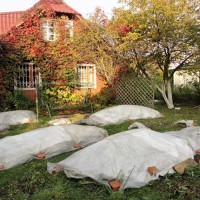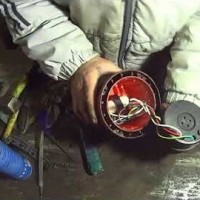Refrigerator and gas stove in the kitchen: minimum distance between appliances and placement tips
Do you want to renovate your kitchen, but don’t know how to properly place household appliances so that they function for a long time, are safe for household members and do not consume more electricity than they should? Agree, you don’t want to wash grease off your appliances every day or pay a lot for light just because the refrigerator and gas stove are too close to each other.
We will tell you how to properly place furniture and appliances to mitigate possible negative consequences. We’ll show you how to protect the refrigerator if the layout does not allow it to be adjacent to the stove.
The content of the article:
Rules for the location of the refrigerator and stove
It is recommended to place household appliances in the kitchen according to “triangle rule" That is, the refrigerator, sink and stove should be located as if in the corners of an isosceles triangle. The optimal distance between zones is from 1.2-2.7 m. Then the devices will not interfere with each other and it will be convenient for the housewife to get food and cook.
Unfortunately, kitchens are often small in size and appliances have to be placed almost end-to-end. Next, we will look in more detail at whether it is possible to place a refrigerator near a gas stove and whether there are generally accepted requirements for placement.
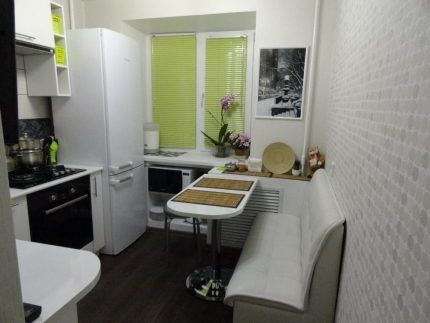
Distance standards between household appliances
All refrigerators differ in power, type of freezing and degree of thermal insulation. Manufacturers must indicate in the instructions the recommended distance for installing equipment from the gas stove. For example, a Zanussi brand refrigerator is mounted from a gas stove at a distance of 50 cm.
If the instructions are lost, then, according to the regulations, minimum distance from any refrigerator to a household gas stove should be 25 cm or more. Ideally, you need to place a table between the equipment.
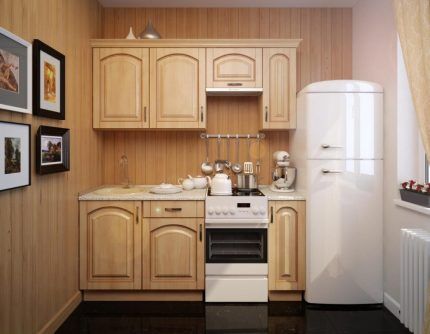
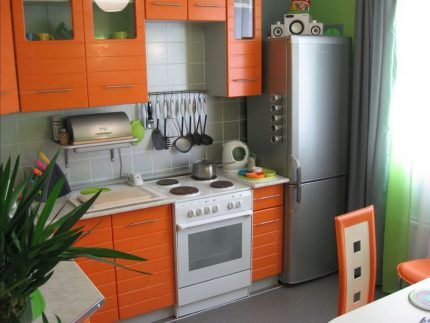
Due to the fact that many furniture companies produce cabinet furniture to order, you can easily “disguise” the recommended gap of 25 cm. Thus, they make storage sections or the same cabinets according to individual sizes.
We also recommend that you familiarize yourself with the rules for placing a refrigerator near the gas pipe.
Consequences of close proximity
The gas stove does not have insulation, so during its operation, nearby surfaces heat up.
If the wall of the refrigerator heats up, it will not defrost, it will not work worse, and the food in it will not spoil. However, the compressor of the unit will turn on more often and work hard. Such a load will negatively affect the service life of the device.
Disadvantages of close proximity of the stove and refrigerator:
- rapid formation of ice inside the refrigerator - due to heating compressor it begins to cool more intensely, as a result the ice freezes faster;
- frequent cleaning of the walls of the refrigeration appliance – during cooking, splashes of fat may fly away, which are subsequently difficult to remove from the metal surface;
- heating spoils the appearance of the refrigerator — the paint swells and turns yellow, plastic handles crack or melt, as well as door frames;
- end of warranty – many manufacturers write in the instructions that the refrigerator should not be installed near the stove, oven and heating appliances; even the minimum permissible distance between household appliances is indicated;
- increased electricity consumption – the compressor often turns on and the device operates at full power.
In addition, if the refrigerator is located right next to each other, then it is not very comfortable to use a gas stove, since you can only approach the hob from one side.
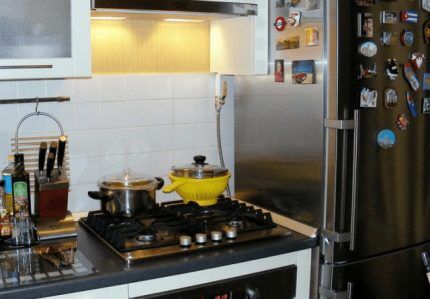
If you still have to place household kitchen appliances nearby, then you need to take care of additional thermal insulation of the refrigerator wall.
Ways to protect your refrigerator
When it is not possible to leave the recommended gap between the devices, you need to make your own partition from a material with insulating properties.Both organic and inorganic materials can be used as thermal insulation separating the refrigerator from the gas stove.
Organic options: reeds, cork sheet, textolite, Chipboard. These materials are moisture resistant and can be used as insulation. But it is worth remembering that with prolonged heating they can become deformed.
Inorganic heat insulators:
- fiberglass;
- asbestos cardboard;
- isolon;
- mineral wool;
- drywall.
The materials have high heat-insulating properties. The only thing is that they can lose their quality when exposed to moisture, so they are not installed next to the sink.
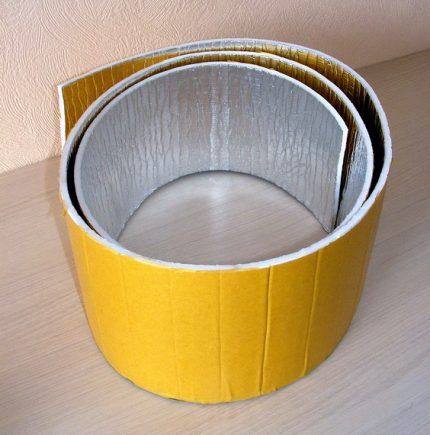
On one side, the rolled thermal insulation has a self-adhesive surface, and on the other, it is covered with a lavsan film. The material should be glued from top to bottom onto the entire surface of the refrigerator wall.
There is no self-adhesive layer on sheet insulation. It is recommended to use double-sided tape to secure it. It holds sheets well and can be easily removed when it is necessary to replace the material.
Instructions for making a protective shield
Shields are used to separate the refrigerator from the gas stove. Thermal insulation can be made from various materials, for example, chipboard. The plates have high rigidity, so they do not need to be glued to the surface of the devices.
Option #1 - thermal insulation with chipboard
A chipboard will help protect the refrigerator from the effects of a gas stove. Install it between household appliances and the stove.
The side cuts of the shield must be covered with adhesive tape. Otherwise, different-sized chips will be visible in the structure. In addition, in places where cuts are not closed, the material is difficult to wash. Therefore, the ends are covered with decorative film or laminated. You can order this service at places where sheets are cut.
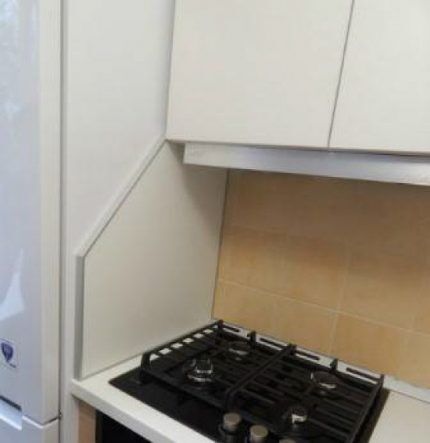
On average, thermal insulation made from chipboard lasts for three years. Afterwards, the appearance is lost, as moisture and heat destroy the structure of the material. But since such thermal insulation is inexpensive, it can be changed at least annually.
Option #2 - constructing a shield from tiles
It looks beautiful and is easy to clean – these are the main advantages of a thermal insulation board made of tiles. It fits optimally into the kitchen design, especially if it matches the style and color of the “apron”.
If moisture gets on the drywall, it will begin to deteriorate. Therefore, when laying tiles, carefully cover the cracks.
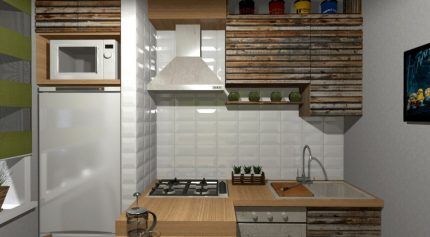
Option #3 - making a mirror screen
Mirror surfaces reflect heat well. Mirror, glass or foil can be used as the main thermal insulation material. Attach the insulation to the partition using glue.
A partition with foil is thinner than other thermal insulation options. To improve the protective properties, you can glue the material onto a thick shield. Then the mirror screen will be durable and last longer.
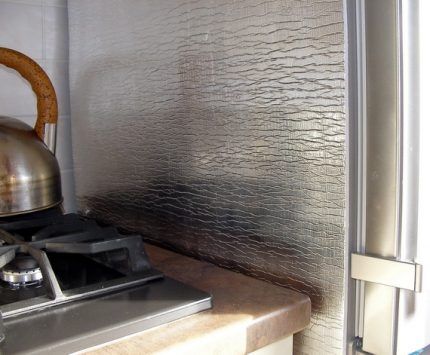
The only disadvantage of such insulation is mirror reflection, but this can be removed if corrugated glass is placed on top.
Ideas for optimal refrigerator placement
If the kitchen is small, then the refrigerator can be installed outside it, for example, placed on a loggia or in a pantry. Some apartment owners place such large equipment in the hallway.
In Khrushchev-era apartments, not only the kitchens, but also other rooms are small. The option of installing a refrigerator in the hallway is eliminated. But in such apartments the interior walls are not load-bearing. If you wish, you can choose a suitable refrigerator and build a niche for it in the partition between the living room and kitchen.
The ledge in the living room is decorated or used as a shelf. It is also convenient to place a washing machine in the free space.
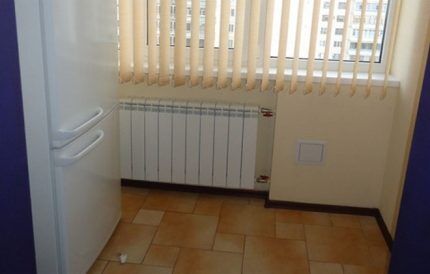
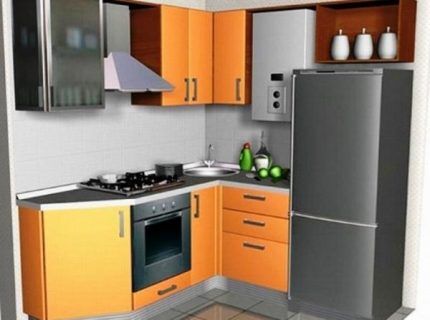
If it is impossible to move household appliances to another room, then you need to take care of good hood in the kitchen. It must be powerful enough to capture as much convective currents from the gas stove as possible.
A good option for a small kitchen - built-in refrigerator. The surfaces of such a device are covered with chipboard or MDF boards.The frame of the box will not only protect the unit from heat, but will also insulate the metal walls from dirt and grease splashes. To improve the thermal insulation properties, foil or other insulation can be glued to the surface on the side of the gas stove.
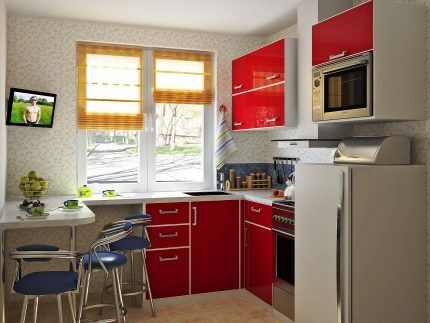
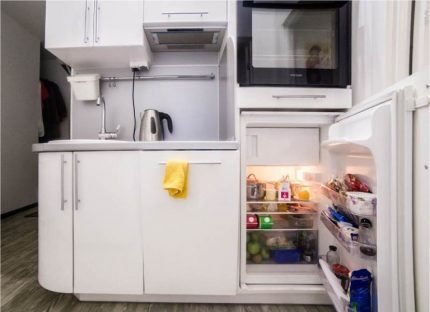
Replacing full-size equipment with smaller versions will help you gain some free space. For example, you can install a stove with two burners. This will increase the distance between the stove and the refrigerator to 15-20 centimeters.
Also available for sale narrow refrigerators, their width is about 55 centimeters. Of course, this is an expensive solution to the problem.
Sometimes it is better to make a small remodel in the kitchen, install a smaller sink or move the slab her to another place. Even a few centimeters of free space will improve the situation.
Conclusions and useful video on the topic
You can see ideas for placing a refrigerator and a stove in a small kitchen in the video below:
Manufacturers of household appliances do not recommend installing a refrigerator and a household gas stove next to each other; the ideal option is in different corners of the room.
The distance between appliances depends on the refrigerator model. The minimum is 25 centimeters. But not every kitchen can afford such placement.
Therefore, in the article we examined existing options for thermal insulation of refrigerators, which can protect against the negative consequences of overheating.
How did you decide to place these two extremely important types of household appliances in your kitchen? Share interesting ideas with other users, add photos of your kitchen, participate in discussions, ask questions - the contact form is located below the article.
